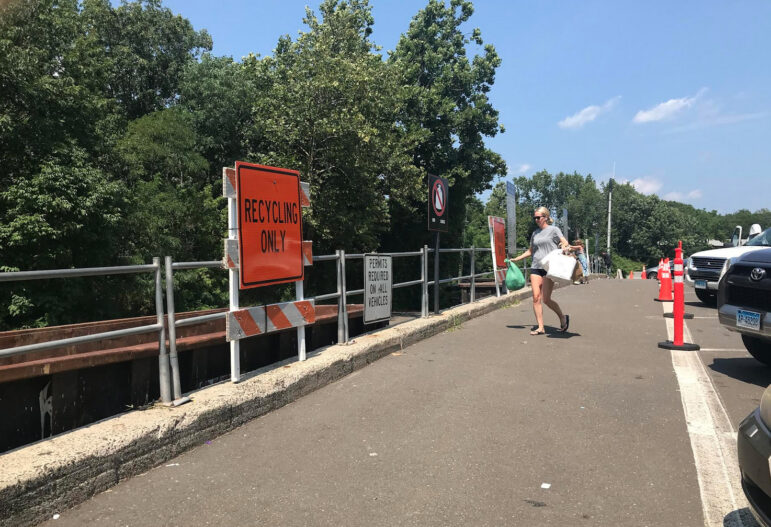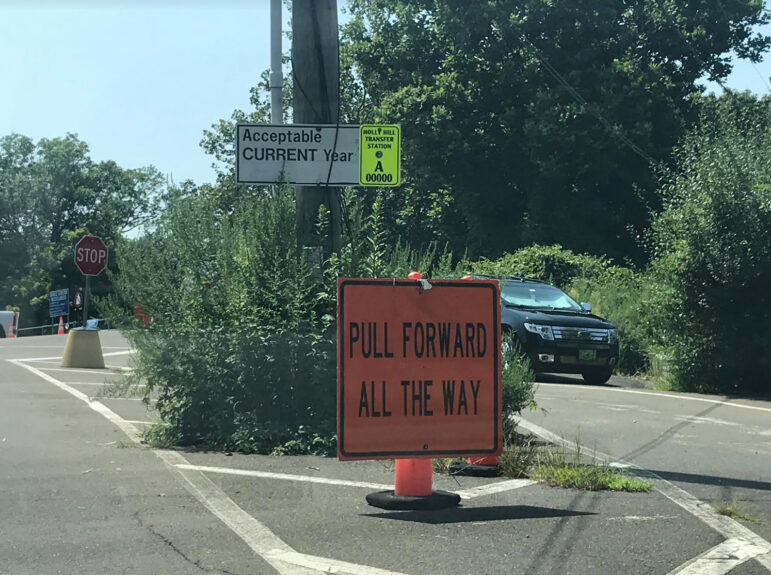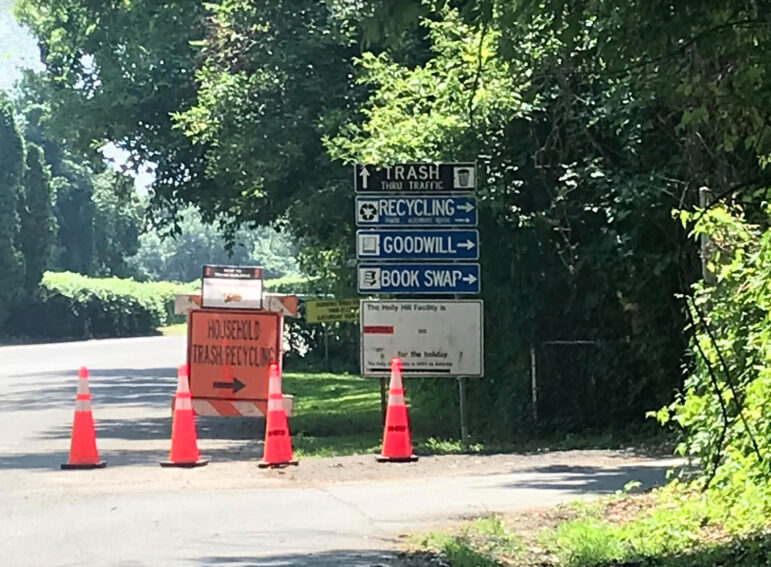During Thursday’s Board of Selectmen meeting, there was discussion of possible amendments to Town Code Section 9-5, the Waste Disposal Fees Ordinance.
The ordinance has already undergone a revisions, starting in July 2020 with the tipping fee, and later a sunset clause.
Thursday’s proposals came via the First Selectman’s Waste Management Committee, which was formed with the goals of reducing waste and closing a budget gap.

Present at the meeting was committee was Cheryl Moss who co-chairs the committee with Michael Basham, and committee members Angelo Pucci and Scott Kalb.
Ms Moss outlined recommendations but said the committee hoped to continue its work. First Selectman Fred Camillo said it was critical that the committee stay intact.
A key suggestion was to lift the sunset clause which is due to expire on June 30, 2022. Some of the fees that went into effect last year will become permanent unless there is some other proposal to modify the ordinance.
Currently, town residents who want to access Holly Hill are required to purchase a $25 permit.
Mr. Camillo said despite the creation of tipping fees on haulers and $25 permit fee for residents, there remains a shortfall in the budget.
He noted that two years ago the town was faced with almost a $5 million hole in the budget when municipal solid waste costs were combined with recycling, which the town had previously been paid for.
“The good news is the tipping fee has almost plugged that hole,” he said. “What’s left is anything between a $300,000 and $400,000 gap, which is caused by people coming down to drop off their municipal solid waste and recycling at the center.” And, he noted costs to the town were anticipated to increase.
Per the municipal waste committee, in the last fiscal year, July 1, 2020-June 30, 2021, 5,728 tons of municipal solid waste were disposed of directly by residents at Holly Hill. At $93.66 per ton, the town paid an estimated $536,500 for residents’ direct drop-off last year.
On the revenue side, the town generated about $193,500 from the sale of 7,740 permits at $25 each. Permit revenues covered about 36% of the total cost of municipal solid waste direct drop off.
The committee noted there was a lack of enforcement at the dump, which has led to complaints, lost revenue and operational inefficiencies.
They recommended the town add resources to address enforcement.

Five Recommended Ordinance Changes:
One proposed change would allow residents without a $25 permit to pay $10 as a fee to enter the Holly Hill facility. They said that would reduce complaints about lack of enforcement.
Ms Moss said residents who pay $25 a year to bring their own solid waste to the dump are “basically getting a free ride.”
DPW commissioner Amy Siebert said most residents seem to understand that the permit is for access to the site, but the $10 per visit fee was ideal because they don’t want to turn away people who may be new to town or don’t want to purchase a permit.
“We don’t want to turn them away,” Siebert said. “But we want to be fair, since everyone’s supposed to have a permit. You don’t want a situation where you have someone coming down to throw out a few things – a computer and a little of this and that — and they decide I’m just going to go home and put it in the trash. We’re trying to come up with a compromise.”
Second, the committee recommend changing the “permit fee” to an access fee. They said that this way it would be clear that residents and commercial visitors should expect to pay extra for disposal of select items such as yard waste, bulky waste and air conditioners.
They also recommended charging a fee per $100 lbs of construction debris, yard waste, and scrap metal, with no fee for the first 50 lbs.

Siebert said residents are disposing bulky waste and there is a lack of language in the existing ordinance to address that.
The fourth suggestion was to be clear about the definition of a passenger vehicle because residents and small businesses are taking advantage of the existing loose definition and bringing in more than a trunk full of debris/yard waste/scrap metal.
Siebert said with a more clear definition, vehicles with more than a trunk full would drive over the scale and be charged the same tipping fee as commercial haulers.
As for the definition of passenger vehicle, Siebert said, “That’s gotten a bit mushier over time. There are people using their station wagons or their SUV type vehicles as construction vehicles.”
Committee member Angelo Pucci said, “We have people using so-called passenger vehicles, pulling out the seats , filling it up with trash and saying, ‘I’m a passenger vehicle.’ These are things that can be tightened up. We have to remove ambiguity about who is going to be weighed and who is not going to get weighed.”
Lastly, the committee suggested including language on the cost per unit for items such as air conditioners and refrigerators.
“Having the scales adjusted to lower the exclusion of the first 200 lbs to 50 lbs will help,” Camillo said. “So will getting people to pay the same amount as the haulers. The $10 fee will help people. Who wants to pay $10 when they can get the permit for $25?”
Though the committee agreed the fee structure should be changed to close the budget shortfall, but they did not reach a consensus on fee pricing. They offered three options.
One would feature a $10 increase from $25 to $35 with a discounting fees for seniors who would pay $25; one would increase the cost of a permit to $75 with a fee discounted to $50 for seniors. A third option would keep the fee at $25, with $0 for seniors, but with an added $1.20 bag fee for a 30-gallon bag.
They said a bag fee has pros and cons: The bag fee is expected to generate revenue of $449,000 and combined with the permit fee, would generate total revenue of $614,000, covering all solid waste direct drop-off costs and providing extra revenues of $77,000 for enforcement resources at Holly Hill.
They said the bag fee would have no negative impact on recyclers and food scrappers but would eliminate” free riding” by those throwing away tons of trash for only $25. Also, they say it would be fair to residents already paying tipping fee through their haulers. They noted the bag fees would not impact the majority of residents.
They said a downside was the RTM’s general dislike of bag fees.
They estimated that with option 3, the average resident disposing of solid waste directly at Holly Hill would pay $75 annually in bag fees and $100 total, including the $25 permit fee.
The First Selectman said the option of a $75.00 fee would eliminate the budget gap.
“My personal favorite was the unit based pricing (pay as you throw), but the RTM wasn’t ready for that,” Camillo said.
“I’d keep advocating to the RTM to remember that we’re not looking to make money; we’re looking to have people pay for what they throw away,” he said.
Committee member Scott Kalb said Connecticut’s main municipal incinerator, which handles 30% of the municipalities’ waste, is set to close.
“That incinerator acts as a break on price increases through the private sector,” he said, adding that when the facility closes down costs are anticipated to rise. Therefore, he said, the committee concluded that it was important to figure out ways to reduce waste.
He said the committee’s conclusion was that the separation of food waste offers the greatest potential for reducing waste and saving money.
The committee recommended the town form a new waste management body to look at food waste.
Also, Kalb said, the committee agreed the town needed to implement a master plan for Holly Hill.
“We can’t keep adding on little bits and changes,” he said.
Selectwoman Lauren Rabin asked about staffing for enforcement. Specifically, someone to check residents display a yellow dump permit, which are designed to hang from a rearview mirror, but also potentially collect the $10 per visit fee if that were to be implemented.
Dept of Public Works commissioner Amy Siebert said currently enforcement is done by people who are “out on injury – light duty.”
“We’re going to have to ask for a person,” she said. “We have people down in the lower area looking for permits. We’re doing the best we can with what we have.”
“A lot of people rat each other out about permits,” she added. “A lot of people show show up, show their permit and then put it away. Then someone sees them and says, ‘They don’t have a permit.’ I ask people to be more kindly to each other. But it’s not always as bad as they would like to paint them. Or, there are folks who say, ‘Everybody knows me. I have my permit, it’s in my glove box.’ So, please just hang it up.”
Camillo recalled that when the $25 permit fee was approved “it caused an uproar,” though many people thought it was too low. He said other municipalities charge between $90 to $150, but there was a lot of resistance in the RTM to a permit fee.
He said he liked the the committee’s recommendations. “But the RTM is a big body and we’re going to hear a lot of complaints.”
The proposal was a first read and will be back before the Selectmen at a future meeting.
